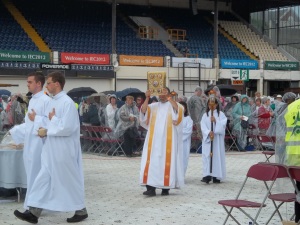There’s a phrase that was quite common when I was attending catechism class as a child, and people in my generation or older will likely recall it (we don’t hear it much anymore –like the word ‘catechism class’ – and most younger people may not be familiar with it)
That phrase or description is ‘a mystery of faith’. One of the more common things that would fall into that category was the nature of the very feast day we celebrate today, the Feast of The Most Holy Trinity. When we talk about the Most Holy Trinity, we are of course, referring to God; God the Father, God the Son and God the Holy Spirit. We invoke the Holy Trinity every time we bless ourselves and make the sign of the Cross. We praise the Holy Trinity each time we say the prayer, Glory be to the Father and to the Son and to the Holy Spirit…
When we baptize anyone and welcome them into the Church as adopted children of God, we use the formula given to us by Jesus Himself as quoted in the Gospel of St. Matthew, ‘baptizing them in the name of the Father and of the Son and of the Holy Spirit.’
The Cathechism of the Catholic Church expresses “The Incarnation of God’s Son reveals that God is the eternal Father and that the Son is consubstantial with the Father, which means that, in the Father and with the Father, the Son is one and the same God… the Holy Spirit, sent by the Father in the name of the Son), reveals that, with them, the Spirit is one and the same God. “With the Father and the Son He is worshipped and glorified” (Nicene Creed).
But we sit and scratch our heads sometimes as we grapple with the idea that we worship one God, but a single God in whom there are Three persons; Father, Son and Spirit – the Most Holy Trinity. When we were children, or for many of us even later in life, when we asked, ‘how does that work- three persons in one God?” we usually received the response, ‘oh, that’s a mystery of faith’……somewhat similar to the answer a father gives a child who asks an uncomfortable question; ‘go ask your mother.’….that answer never satisfied.
In fact, those outside the Church, or those who refuse to be open to God, often use that response as their rationale for why they don’t believe in God. They see the response, a ‘mystery of faith’ as a “cop out” – as if by calling something a ‘mystery of faith’ we are saying no only that ‘we don’t know’ something, but also that there is no answer.
But the Catechism of the Catholic Church is just as clear about what the nature of a ‘mystery of faith’ is, particularly when it applies to the Holy Trinity;”The mystery of the Most Holy Trinity is the central mystery of the Christian faith and of Christian life. God alone can make it known to us by revealing Himself as Father, Son, and Holy Spirit.”
In other words, this great mystery of the Most Holy Trinity is something that only God can reveal to each and every one of us, and He reveals that to us when we open ourselves or prepare ourselves to receive that revelation.
In our passage today from the Gospel of St. John, Jesus Himself tells the apostles that He has many things to tell them, but that ‘they cannot bear them’ right now. He goes further to explain that the Spirit will reveal these things to them over time, things handed to them by the Father. He’s not saying that these other ‘things’ – these mysteries – are not understandable on any level by the apostles – He’s telling them that on their own, right now, they are not able to ‘bear them.’ That at that moment, they are not capable of understanding these mysteries; He’s not saying ‘never’ – He’s saying, ‘not yet’. They need to grow in their faith lives and in the Spirit.
In his letter to the Romans, St. Paul writes, “endurance produces character, and character produces hope, and hope does not disappoint us, because God’s love has been poured into our hearts through the Holy Spirit …” – even St. Paul acknowledges that we need to go through stages of growth, but that this growth is powered or fuelled by our willingness to receive God’s love, our openness to the Holy Spirit. Our knowledge of God has to grow; our prayer life has to grow.
We need to first understand that because we don’t fully comprehend a mystery does not mean there is no possibility of understanding anything about it. Quantum Physics is a complete mystery to me, but it is not completely unknowable, provided I am willing to take the time to read or study or speak to someone who might provide me with some basic understanding of its principles. And just because I have no understanding of it right now, does not mean that it’s principles don’t exist, or that I will never understand anything about them.
A mystery doesn’t mean we can’t understand anything; it means we can’t understand everything, and there is a world of difference between those two things.
Take for example, a major art gallery; there will be works of art in the main lobby, and a real student of art could spend all day simply studying those artworks; but when we enter the building and look past the lobby, we realize there are halls and corridors throughout the building and there are rooms off of all of those corridors, and there are pieces of art in each of those rooms; we cannot absorb all of the art in the building , simply from entering the lobby. And even if we could, there is more and more to each piece of art; a person could spend an entire lifetime studying one painting by one of the ‘masters’; they could even study and develop their own skills to the point where they might even be able to reproduce an exact copy of one of these paintings. But they will never completely understand the artist’s experience and know what was in their heart or going through their minds at the moment they touched brush to canvass simply because they are not the artist; their own experiences are as distinct as they are; they can come very close to understanding that one painting, but they will never completely understand it; they can know something – they just cannot know everything.
But in order to understand anything, we have to take that first step, like studying Quantum Physics, or examining those paintings; we need to open ourselves to the Holy Spirit’s action in revealing that understanding – that experience. The first way to do that, is to enter into prayer, to actually take the time to say to God, ‘ I desire to know You better Lord’. But we cannot expect to have all the answers immediately – because like the apostles, we cannot bear them yet. Just as we can’t expect to know everything there is to know about a new friend until we get to know them better by spending time with them and talking with them, we shouldn’t expect to know everything about God if we aren’t willing to spend ‘quality time’ with Him. And even in spending ‘quality time’ with God, we shouldn’t expect to be able to know ‘everything’ because, quite simply, we are not God and in this lifetime, we cannot fully comprehend the mind of God.
One of my favourite saints, St. Augustine a doctor of the Church who wrote extensively in the 5th century, considered much about the Holy Trinity. He had a deep desire to understand more fully this mystery of three persons in One God, and more importantly –to be able to explain it. There is a story told , how while he had spent considerable time trying to understand this mystery, one day he walked along a beach and suddenly saw a small child alone on the shore. He watched while the child made a hole in the sand, took a little cup and ran to the sea, filling the cup and pouring it into the hole in the sand. After watching the child go back and forth over a period of time, St. Augustine went up to the child and said, ”what are you doing?” The child replied, ‘trying to empty the sea into this hole.”
Augustine, amused said, ‘how do you think you can empty this immense sea into this tiny hole with this tiny cup?’
To which the child answered,” how do you suppose that with your small head you can comprehend the Immensity of God?” and then the child promptly disappeared.
As people of faith we need to spend time considering the Triune God who so blesses us as Father, who redeems us as His Son, and who makes us holy through His Spirit. But to do that, we need to pray, and pray often; not simply when we come to Mass on Sunday, but at other times and at any time we feel that movement of the Spirit to think of or speak to God.
Ultimately, as St. Augustine also wrote once; it is far more important to worship the Holy Trinity, than to understand the Holy Trinity.
And so, I would invoke God’s blessing on all of us here, that each of us will grow in a deeper knowledge, understanding, and love of God and each other in all of life’s ‘mysteries’ In the name of the Father, and of the Son and of the Holy Spirit. Amen.
Praised be Jesus Christ, now and forever!



